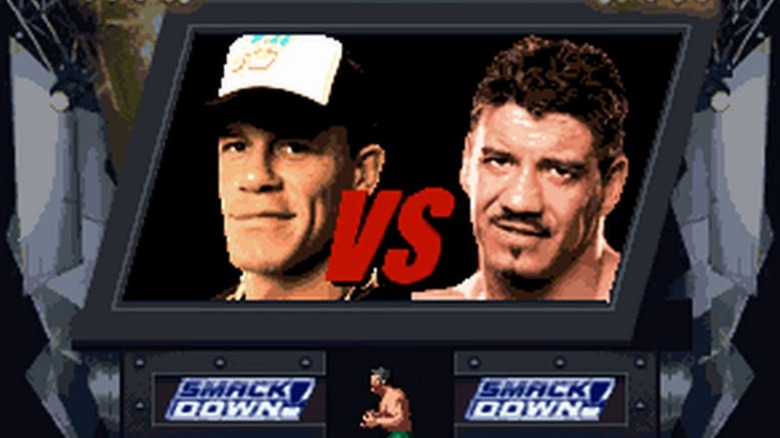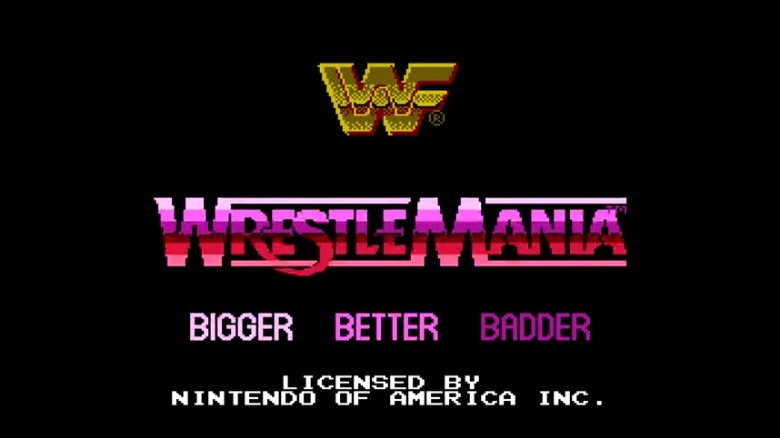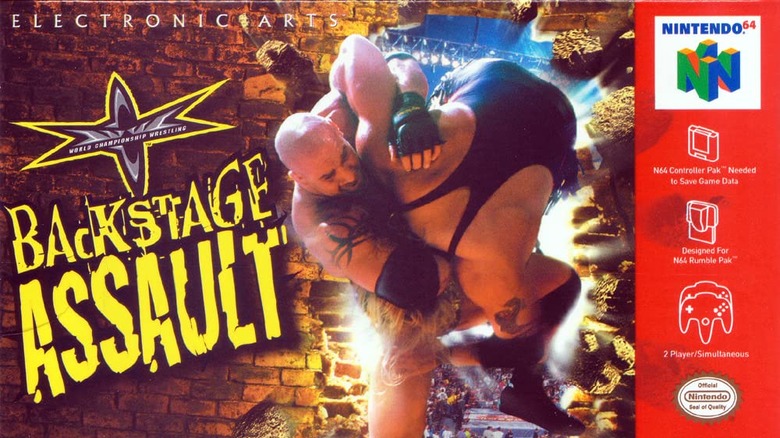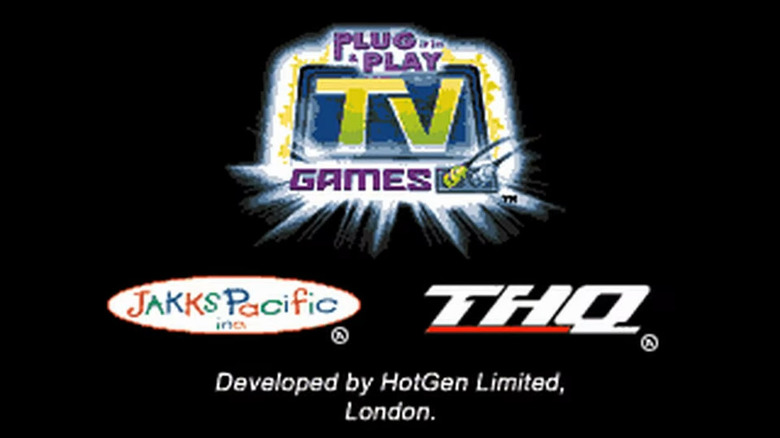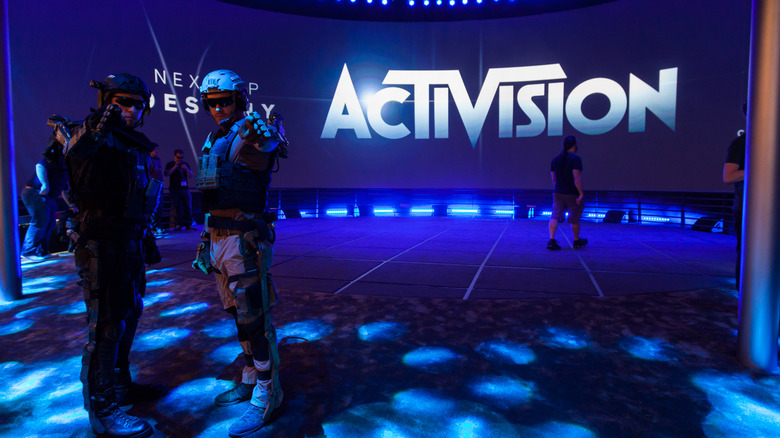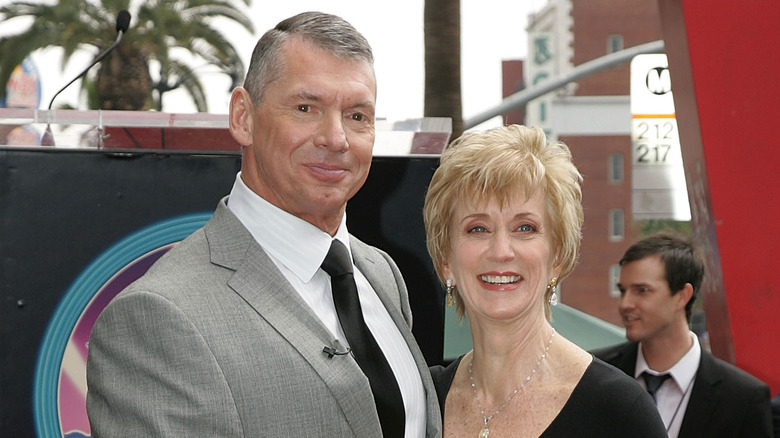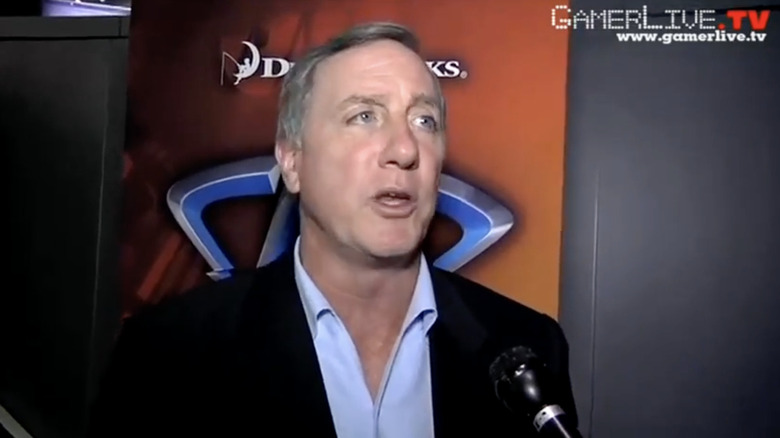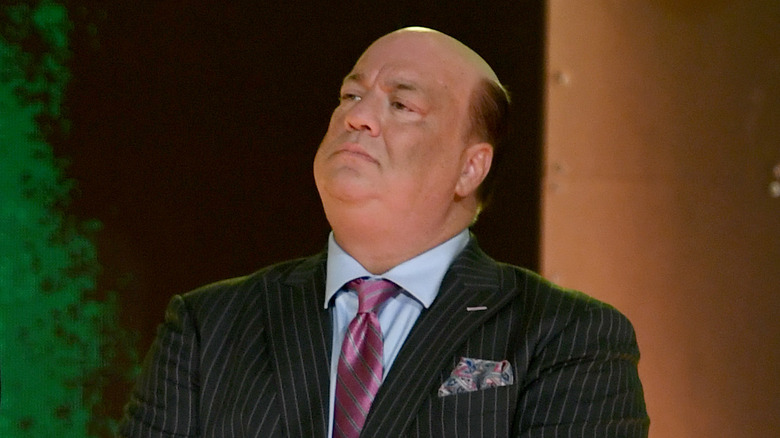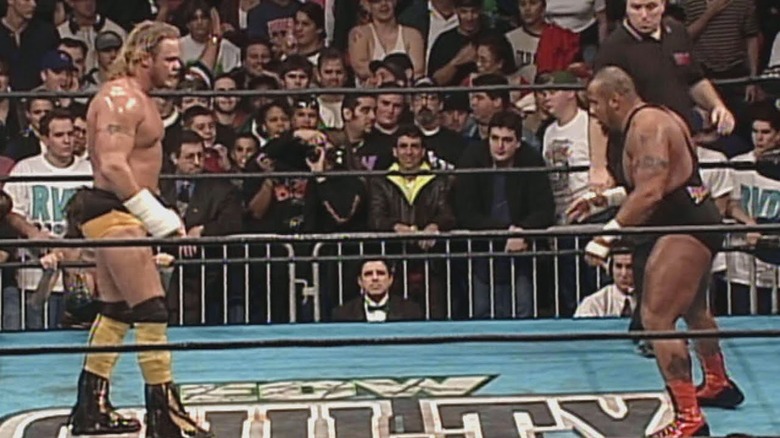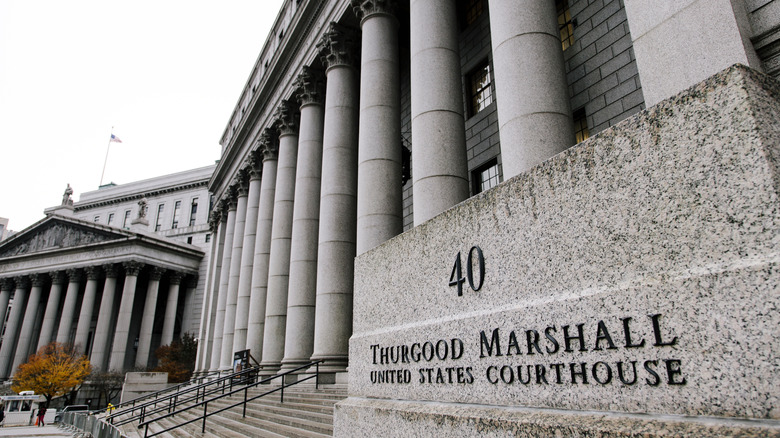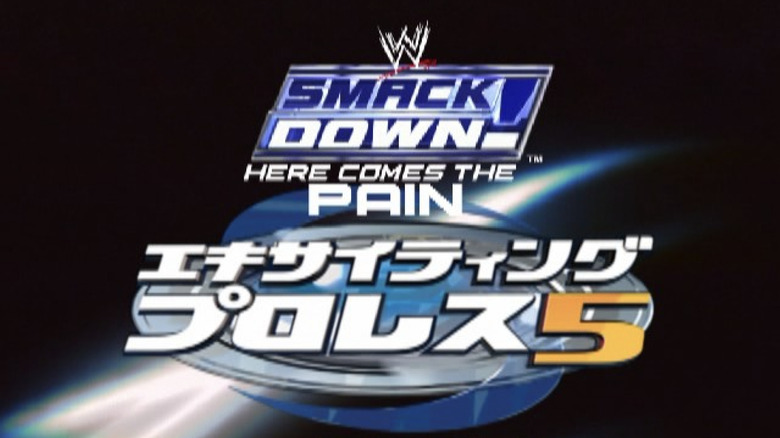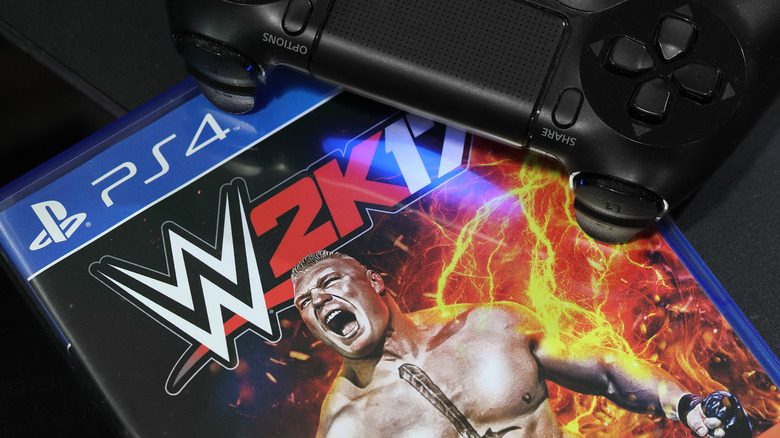The Lies And Lawsuits That Changed Wrestling Video Games Forever
In 1998, the wrestling business was booming, with both major American promotions drawing big money. The WWF (now WWE) had turned a corner with the ascendance of "Stone Cold" Steve Austin, while WCW was peaking thanks to the continued dividends being paid by the NWO storyline and its various offshoots. As a result, it should have worked out perfectly that both companies' video game licenses were up that year: The WWF's decade-long deal with Acclaim and WCW's two year old relationship with THQ. Both had been successful, but to be blunt, outside of their wrestling games, both Acclaim and THQ were not exactly considered first class publishers, with both relying heavily on brands licensed from popular TV shows and movies. This new contract season seemed ripe for offers from heavy hitters like Electronic Arts and Activision, and that's what happened ... sort of.
The story of what led to the wrestling video game license shuffle of the late 1990s has never been collected in one place before. It involved allegations of bribes, kickbacks, money laundering, and fraudulent loans, resulting in numerous lawsuits and at least two federal prosecutions, among other assorted fallout affecting the wrestling, video game, and toy businesses. Even by the standards of the wrestling business, it's a lot to digest.
How we got here
The wrestling video games were huge money makers for THQ and Acclaim, with the WCW series completely changing THQ in particular. "Including revenues generated from 'WCW vs. the World' under the PlayStation's Greatest Hits program, sales of WCW-related products accounted for 88 percent of THQ's revenues in the first quarter of 1998," reads an April 21, 1998 THQ press release about their first quarter financials. CEO Brian J. Farrell added that "The success of our WCW titles exceeded our expectations in the first quarter." Indeed, they accounted for roughly 40% of THQ's 1997 sales according to a June 15 Los Angeles Daily News report. This overwhelming success came just over two years into the contract and about a year into actually having WCW games on store shelves, to boot.
It's harder to pin down specifics for Acclaim's WWF titles, but they were clearly a big part of the publisher's success throughout the relationship. "Retail reports of sales for Acclaim's 'WrestleMania' products has [sic] truly been incredible," reads a June 2, 1989 Acclaim press release about their first WWF game. "In fact, many stores have been unable to keep Acclaim's 'WWF WrestleMania' for the Nintendo Entertainment System in stock for more than 2 or 3 days, and several major retailers were forced to give out tens of thousands of rainchecks." Acclaim would further tout the "tremendous success" of the WWF series in a 1993 press release and release new games in the series more or less annually for the duration of the license.
And then both licenses came up for renewal at about the same time in 1998.
THQ loses the WCW license to Electronic Arts
WCW was up first, and they scored big, signing a deal with Electronic Arts that the two companies announced in a joint press release on March 12, 1998. "World Championship Wrestling is a huge spectator sport that is growing at an amazing rate," said Larry Probst, EA's Chairman and CEO, according to the release. "We believe that our world-class creative organization can successfully translate the passion that fans feel for the WCW into best-selling products for both video game consoles and PCs." The news did not bode well for THQ: According to a syndicated Bloomberg News article published that day, when THQ announced a few hours before EA's own announcement that they weren't renewing the WCW deal, their shares on the NASDAQ dropped more than 24%, from $32.44 to $24.50 apiece.
"Ultimately, I think the fall in the share price has more to do with perception than reality," analyst Ken Trbovich told Bloomberg. "They'll have to find something to supplant the [WCW] title[.]" It also wasn't the end of the deal as far as selling products: THQ had until December 29 to release new games and until June 29, 1999 to sell stock on hand. Then-THQ CEO Brian Farrell told Wrestling Inc. that "EA made a very aggressive bid, and at the time, that was way outside of what we were willing to pay ... even if it's a lot of your revenues." He added that "We could have kept bidding with EA, who knows where their pain point was. We went to the point where we were comfortable, they ended up getting it, and we turned our attention elsewhere."
But just how was THQ going to replace WCW, anyway?
Jakks developed a scheme to get the WWF license despite being the worst candidate
At least according to an amended complaint WWE filed in March 2005 as part of their federal lawsuit that's central to this story, Acclaim didn't even know they weren't being renewed when THQ was officially freed up on March 12. Less than two weeks later, though, on March 25, James Bell, then the WWF's Senior Vice President of Licensing and Merchandising, told Acclaim that he wouldn't entertain any renewal offer they made, though his superiors told the publisher to disregard those comments. Just five days after that, on March 30, without having yet received a formal proposal from Acclaim or solicited other bids, Bell recommended to his superiors at the WWF that the video game license go to Jakks Pacific, their action figure licensee. Though Jakks would later become a prolific manufacturer of "plug and play" video games that did not require a traditional game console to play, they were, as of early 1998, not in the video game business at all.
Huh?
As it turned out, as admitted to in Bell's February 2005 plea agreement on mail fraud charges, there had been a scheme hatched in January 1998 where, as alleged by Bell, Jakks would pay bribes and kickbacks to Bell and third party WWF licensing agent Stanley Shenker to direct the video game license to them. "The terms recommended by Shenker and Bell without even attempting to secure any other bids were well below then[-]prevailing market rates for a videogame license of the quality of WWE," reads the aforementioned March 2005 amended complaint. With Bell's superiors as well as everyone at Acclaim none the wiser, the WWF granted preliminary approval to the Jakks deal, telling Acclaim on April 15, 1998 that they had no intention of renewing the existing deal.
There were other suitors making better offers
In the meantime, longtime top game publisher Activision reached out on April 7. "[T]he chairman of Activision wrote to Bell advising that Activision was prepared to move promptly to secure the rights and indicated that Activision's financial strength would allow them to offer the most competitive financial terms," reads the March 2005 complaint. THQ met with Bell and Shenker on April 16, with Activision meeting with Shenker the following day; both publishers were seemingly being steered away from a potential deal. Proposals sent in the next couple weeks outlined terms that were "clearly superior" to those of the Jakks deal, but Bell and Shenker hid them from Bell's bosses at the WWF.
Bell claimed a multitude of factors influenced his decision making. "In 1998, as I was facing the conclusion of my divorce and at the same, without realizing it, suffering from the effects of bipolar disease, Lyme disease and sleep apnea, all of which have been diagnosed subsequently, I irrationally thought I was facing financial ruin," he wrote in a sworn affidavit he filed in May 2004 in a separate civil lawsuit that WWE filed against him in Connecticut Superior Court. "At that time, Stanley Shenker told me that he could assist me by sharing the commissions he was receiving from WWE, which he said were more than he ever could have imagined." As a third party agent, Shenker was entitled to commissions to the deals that he brought in. Bell, as a WWF employee, was not. Redirecting new licensees to Shenker allowed for Shenker to see commissions that he otherwise wouldn't be entitled to, and if he did so, Shenker split the commissions with him.
As alleged by WWE, this wasn't limited to Jakks, but what made Jakks unique was that they were accused of bribing Shenker, as well.
Bell's side of the Acclaim story has an interesting twist
As Bell explained it in his affidavit, the idea that the Acclaim license was not to be renewed had actually predated the Jakks scheme and came directly from Vince and Linda McMahon. (While at least as of Shenker's May 2007 sentencing in his own prosecution on conspiracy and fraud charges, WWE praised Bell's willingness to make things right in their victim impact statement, they didn't always take that stance. Their March 2005 complaint against Jakks framed Bell's affidavit as "false," so it's best to take the following quote with a grain of salt.)
"Acclaim was an eight-year-old deal which preceded my involvement with WWE and originally had been brought to WWE by its prior agent, Al Kahn of Leisure Concepts," Bell wrote. "As part of his agent separation agreement, Leisure Concepts was to continue receiving their 30% commission on the Acclaim license. Later, Leisure Concepts became WCW's licensing agent and it was more than annoying to Vince and Linda McMahon that the licensing agent for their prime competition was making money off their video game license to use against them. Thus, I was instructed by them that they were not to be renewed under any circumstances."
THQ's Brian Farrell recalled that "Jim Bell was adamant that having a co-licensing [deal] for toys and video games, [with] the opportunity to co-market and co-brand and do events and blah blah blah ... It wasn't crazy. We didn't like it. We would have preferred to have a direct deal with [the WWF] and we told them that."
Regardless, even taking Bell at face value, this created the opening for Jakks to allegedly bribe their way into a preliminary deal and propose a mutually beneficial partnership with THQ that would get an actual video game company on Jakks' side. After Jakks made contact, THQ ceased dealing directly with the WWF. In May, the deal would be ironed out between the WWF and the new Jakks/THQ partnership, with a formal proposal sent by Activision on May 12 never being forwarded to senior WWF leadership.
The Jakks/THQ deal is announced and quickly starts paying off
On June 11, 1998, one day after the contract with the WWF was signed, Jakks and THQ announced the new deal in separate press releases. "It is a natural combination of Jakks' expertise with WWF action figures and THQ's experience in making wrestling games," said Stephen Berman, Jakks' president and COO. "Together, Jakks and THQ should be able to take this license to the next level of popularity." How exactly "expertise with WWF action figures" would benefit the video games from THQ, which had quickly developed a track record of making critically and commercially successful wrestling games, was left unexplained.
"From our perspective at the time, we didn't know about the bribery at the time, but the WWF's senior vice president — or whatever he was — insisted on that structure!" recalled THQ's Brian Farrell. "That's the first thing I said to the McMahons when I met them: 'This was not my choice!' You could say it looked fishy, but it's the fish that you threw at me ... we would've preferred Jakks out of the deal, too."
The immediate dividends paid by the announcement were mixed. According to a Wall Street Journal article from the next day, THQ's stock went up 11%, well ahead of various tech indexes that day, which went down, but Jakks stock stayed flat. An analyst for Joseph Charles and Associates would push the Jakks stock as worth buying in a press release on June 23, though, and Jakks showed further strength by announcing the renewal of their WWF toy deal on July 7.
As the odd man out, Acclaim looks to make a deal with ECW
In the immediate aftermath of the news about the THQ/Jakks partnership, Acclaim was clearly the big loser. After a decade of putting out the big brand-name wrestling video games in the west, they found themselves without a license. To make matters worse, the way that the timelines of the various development cycles and contracts played out made it so that the first THQ/Jakks WWF title, "WrestleMania 2000," would come out just three and a half months after the release of Acclaim's second 3D WWF title, "Attitude." In the meantime, though, if they wanted to keep the lucrative wrestling section of their business going, they needed a new license. At that point, there was only one option left: Paul Heyman's Extreme Championship Wrestling.
A report in the March 1, 1999 issue of the Wrestling Observer Newsletter says that, after EA signed WCW but before the THQ/Jakks deal, ECW had signed with THQ, resulting in THQ auctioning off the ECW rights after the Jakks deal made the ECW deal untenable. (A contemporaneous post on the alt.games.wrestling Usenet discussion group suggests that Dave Scherer, then of 1wrestling.com, corroborated Meltzer's reporting.) Speaking to Wrestling Inc., then-THQ CEO Brian Farrell recalled that there were definitely talks with ECW, but he couldn't remember how far they went, with a separate source close to the negotiations claiming that THQ secured an option on the license from a separate deal ECW made with Kodiak Interactive Software.
A 2004 federal court ruling in a lawsuit Acclaim filed against members of ECW management, though, citing Acclaim's complaint, says nothing of an auction or anything involving THQ or Kodiak, just that Acclaim approached ECW in January 1999. (A source close to the negotiations asserted to Wrestling Inc. that Acclaim didn't mention a bidding process in the lawsuit because the chain of events would not have reflected well on them in court.)
Jakks wasn't the only company in the wrestling license shuffle accused of some funny business
At least according to Acclaim, when they went to HHG, ECW's parent company, they got some unexpected news. "HHG was wholly owned by its founder, wrestling promoter Paul Heyman, but Annodeus was told during negotiations that he had turned over control of HHG's business and finances to ECW Management under the terms of a written agreement," reads Hon. Denise Cote's aforementioned September 16, 2004 ruling in the eventual Acclaim-ECW management lawsuit, citing Acclaim's complaint. Allegedly, ECW Management Group was "a joint venture" formed by lawyer Eugene Boffa, accountant/Boffa employee Eugene Ciarkowski, and ECW managing director Steve Karel; why exactly Heyman would've ceded legal control of the business side of his company is never explained. (A source close to the Acclaim negotiations told Wrestling Inc. that ECW Management Group was indeed a real thing, with Heyman ceding that control being why he was not named in Acclaim's lawsuit.)
Acclaim alleged that on April 30, 1999 Ciarkowski provided them with fraudulent ECW financial projections, "forecast[ing] a profit of $500,000, whereas HHG lost at least $2,500,000 during the relevant period." Several weeks later, in July, they struck a deal for the game license, followed by Acclaim buying 15% of ECW in August for $1.5 million and a $1 million loan. But even with that help, ECW started asking for more, even before the release of the first game. Starting in January 2000, ECW asked for more loans ($175,000 on three occasions, or $525,000 total) to make payroll, using incoming pay-per-view payoffs as collateral. One problem with that: Those receivables were already promised to Quantum Corporate Funding. The resulting lawsuit was settled in August 2005 while Acclaim's bankruptcy was ongoing.
Shenker accidentally revealed his scheme with Bell and Jakks to the WWF
Meanwhile, the WWF deal with the THQ/Jakks partnership seemed to be going off without a hitch, with no public signs of wrongdoing past maybe some confusion over why Jakks was involved. Of all people, Stanley Shenker ended up being the one who upset that status quo, which was not his plan. He sued the WWF in Connecticut Superior Court on October 16, 2000 for outstanding commissions that he claimed he was owed per the terms of their separation agreement. Over the course of the lawsuit, as outlined in a ruling issued by Hon. Chase Rogers on October 16, 2003, Shenker would, among other things, repeatedly admit to perjury while he sat for a sworn deposition and, when producing documents to WWE in discovery, accidentally include records of his kickback payments to James Bell that he had intended to withhold.
It was this mistake that led to WWE finding out about the alleged Jakks bribery scheme. As outlined in WWE's aforementioned March 2005 complaint against Jakks, they started requesting records of Jakks' dealings with Shenker on November 5, 2003, three weeks after Rogers' ruling. Six days later, Jakks CEO Jack Friedman phoned WWE CEO Linda McMahon, claiming that they found payments to a Shenker shell corporation ... but that they were for perfumed doll and toy dinosaur products unrelated to WWE. Further production of invoices would show that the payments dovetailed with the kickback payments that Shenker and Bell eventually admitted to, and this armed WWE with enough information to file the big federal lawsuit that's been cited throughout this article.
WWE sues Jakks and THQ
On October 19, 2004, WWE sued Jakks and its sister companies, THQ, and the Jakks/THQ partnership. Shenker and his company, Bell and his shell company, and Jakks executives alleging, among other things, Racketeer Influenced and Corrupt Organization Act (RICO) violations and various acts of bribery. "We very much regret having to take this action today, but regret even more the facts and circumstances which have compelled us to do so," said Linda McMahon in WWE's press release. "WWE's intellectual property is a valuable asset of the Company, and we believe the actions taken today are necessary to preserve the integrity of our licensing process and essential to ensure that WWE receives appropriate and fair compensation for the grant of a license to use our intellectual property."
Jakks, of course, denied all wrongdoing in their own statement, while THQ noted in their press release that they were not directly accused of any wrongdoing in the complaint. Even later on, when WWE filed the March 2005 amended complaint cited throughout this article, WWE only went so far as to allege that THQ executives should have found the bidding process unusual and recognized that something less than above board was going on. Regardless of their protests, stock in both Jakks and THQ fell in the coming days. Meanwhile, Los Angeles Business Journal reported on October 25 that just six days before the lawsuit was filed, Jakks executive Michael Bianco — described as being fourth in line in the company behind those named in the lawsuit — came to an agreement to leave the toymaker. Perhaps most tellingly, as part of his termination agreement, Bianco was required to tell Jakks if he was legally compelled to disclose confidential information about the company.
Bell and Shenker both copped guilty pleas in their criminal cases
Before long, other dominoes started to fall. On February 10, 2005, Bell was indicted in federal court, with his pre-negotiated guilty plea on mail fraud charges filed the same day. (That plea would officially be entered 13 months later, on March 14, 2006.) In his plea, Bell stipulated to the kickback scheme with a co-conspirator referred to as "S.S." (remember, Shenker had already been named in various lawsuits, so this was not difficult to decipher), though the licensees involved were not named. (Again, the pending lawsuits made some of this fairly obvious.)
Shenker, meanwhile, was indicted in federal court on June 6, 2006 on conspiracy and wire fraud charges. His own guilty plea would first be filed on January 12, 2007, with the official judgment entered four months later on May 9. "Shenker ... paid Bell approximately $950,000 in secret payments from 1998 to 2002 which was approximately half of the money (approximately $1.9 million) that Shenker received from WWE for certain commission payments," he stipulated in court. As with Bell, the licensees went unnamed.
WWE filed another lawsuit against Jakks and THQ over the Japanese versions of the SmackDown games
In the middle of all this, WWE filed another lawsuit against Jakks and THQ, this time in Connecticut Superior Court in October 2006. At the time, GameSpot reported that this suit dealt with the allegation that the THQ/Jakks partnership had illegally sublicensed the" SmackDown" video games to developer Yuke's to sell in Japan as the "Exciting Pro Wrestling" series. "The WWE had been aware and had consented to the manner of distribution in Japan and the payment of royalties with respect to such sales and, in addition, had separately released the joint venture from any claims with respect to such matter as a result of a settlement of a royalty audit of the THQ/Jakks joint venture," GameSpot quoted THQ as saying in a statement.
Finding documentation of this lawsuit is much more difficult than that of the federal cases, and when speaking to Wrestling Inc., then-THQ CEO Brian Farrell didn't recall the Connecticut suit. However, in a March 2020 YouTube video, former THQ employee Justin Leeper said that the litigation ended with THQ being found to, once again, have clean hands. As Leeper explained it, this led to the creation of THQ Japan, where he worked, with the goal of keeping tabs on Yuke's so they didn't pull any more stunts that could put the WWE license at risk. In addition, he added that a deal was made to prevent Yuke's from working on non-WWE wrestling games, which they had last done with the May 2007 release of "Wrestle Kingdom 2," although a 2009 Delaware Chancery Court ruling suggests that rule was already in place going back to 2000.
Everything finally got settled after five years of litigation
Everyone kept going back and forth in court, with small victories on all sides, before everything came to a head in 2009. THQ bested Jakks in both Delaware state court in May (in a Jakks effort to see their books with the argument that THQ's UFC video game competed directly with their WWE games) and an arbitration proceeding in July (over how much Jakks was to be paid out of the partnership). Jakks tried and failed to extend the license, as well, in a moment of peak hubris. Eventually, on December 23, 2009, all three parties — WWE, Jakks, and THQ — issued a joint press release announcing the settlement of all pending litigation as well as THQ getting the video game licenses to themselves for eight years effective January 1, 2010. "As part of the resolution of these matters, THQ will pay WWE $13.2 million," it reads, later adding that THQ would also be paying Jakks a total of $20 million over the next four years to get out of the deal.
"Once we discovered [the bribery], we were livid," Brian Farrell told Wrestling Inc. "The lack of candor ... it made us very much sour on what was always sort of a strange relationship with Jakks as more facts came out at the end of the relationship."
Unfortunately for THQ, they weren't long for this world. They filed for bankruptcy in December 2012 and sold the WWE license to Take-Two Interactive/2K Sports in February 2013. Nordic Games bought the THQ name and some of their other intellectual property out of the bankruptcy proceedings, rebranding as THQ Nordic in 2016. To complete the circle of life, THQ Nordic, the spiritual successor to THQ, will be publishing the soon to be released AEW Fight Forever, which is being developed by Yuke's. "It makes me smile to have the name live on," Farrell said. "At the end of the day, we built something that people remember and value ... it makes me smile when I look back."
